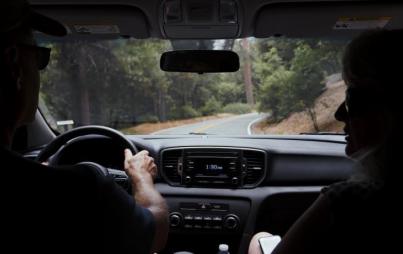
She had lived a long time, but constant fear had governed her life.
Maybe because I struggle to achieve a “healthy” level of anxiety in my life, I’m more sensitive to the rhetoric of fear.
“I really don’t think you should go to Hawaii this month. You heard about Zika, right? I mean, you don’t want a microcephalic baby.”
“I’m not pregnant.”
“Yeah, but you’re trying.”
“Zika isn’t a problem in Hawaii. It’s a problem in South America.”
“Yeah, but I don’t know. Can you think about postponing your trip?”
“No.”
When I hung up the phone, I felt cranky and resentful. Yes, my friend was looking out for me — but her anxiety seemed oppressive.
I was confident that avoiding sunburn was the only thing I should worry about in Hawaii, but as I went about my errands, familiar thought patterns started emerging: Are you really so selfish that you would put a potential baby in danger so you can go to Hawaii? What if you get pregnant on your trip and get Zika at the same time?
Then the CDC warning came out. Although it didn’t really tell us anything new about the dangers of drinking excessively while pregnant, it did offer some troubling advice: Women, if you’re not on birth control, don’t drink. And also, if you do drink, you’re probably going to get sexually assaulted and an STI to boot. This rhetoric seems grossly paranoid and also incredibly sexist.
I had a conversation with my doctor about my concerns, and she, mercifully, rolled her eyes. “Americans are extremely anxious about prevention. We want to be in control all the time. Does this worry affect our quality of life? I think so, yes.”
When I was diagnosed with Generalized Anxiety Disorder a few years ago, I was actually relieved. My life had been one big cauldron of raw, loose nerves, it never felt quiet in my mind.
Thoughts would race from one question to the next. Did you leave the stove on? Did you thoroughly wash your new bathing suit bottoms? Why do you keep getting phone calls from Chula Vista, California? Did the dog eat that piece of chocolate? Should you make the dog throw up? Should you take the dog to the vet? Why haven’t your hemorrhoids gone away yet? Will the taxi driver sexually assault you?
Perhaps more than other cultures, America is obsessed with the illusion that if we prepare, we can avoid. Instead of learning to be resilient and cope with hardship, we drive ourselves dangerously close to madness trying to come up with ways to prevent catastrophe.
Danger lurks around every corner, whether from challenges to the social and cultural order or from a scary new medical discovery. We are nervous about difference, petrified of change, and hyper-vigilant regarding perceived threats. We have even given up liberties whole-heartedly so that we might be “safe.”
♦♦♦
When I think about victims of fear culture, I often think of my paternal grandmother. The product of a Sicilian immigrant upbringing, she was both nervous and morbid.
She had been denied an education past grade school and was desperately afraid of getting pregnant. She wanted to adopt instead, my mother told me recently, because she was afraid she would die giving birth. My grandfather wouldn’t allow her to adopt, and she became pregnant instead.
I have two striking memories of my grandmother. One very hot summer day, when I was 12, I decided to ride my bike around the neighborhood. I was wearing a halter top that hit my waist, leaving my belly button exposed to the summer sun.
As I got ready to leave the house, my grandmother stopped me. “You can’t go out like that,” she said frantically. “Men will look at you.”
I hadn’t yet experienced the predatory male gaze she warned me of, but something about her fear made me bristle with discomfort and annoyance.
A few years later, I was home visiting from college, where I had been unsuccessfully coping with my own increasing anxiety problems. That first night, I woke up to sputtering screams from down the hall. I saw my father (a doctor) wearily walk towards my grandmother’s room with a blood pressure monitor.
“What’s going on?” I asked.
“She’s probably having another panic attack. Don’t worry about it.”
I followed him and quietly watched as he asked my grandmother some questions. She was laying sideways on the bed, making bubbling sounds and clutching at her chest. She twitched and shimmied like a frantic fish. Finally, she cried out that she was dying for sure this time.
After my father calmed her down, he told me to go back to bed. “Was she always like this?” I asked him, afraid that I was staring into my future.
“Yes, but it’s gotten worse over the years.”
My grandmother lived to be 98. At her funeral, a lot of people said “God bless” when I told them how old she was.
I didn’t really think there was any kind of goodness in that. She had lived a long time, but constant fear had governed her life.
♦♦♦
Maybe because I struggle to achieve a “healthy” level of anxiety in my life, I’m more sensitive to the rhetoric of fear.
After all, there is a very significant difference between being educated, aware, and careful and being overly anxious, hyper-vigilant, and paranoid.
When I go to Hawaii, I’m going to use mosquito spray — not because I’m worried about Zika, but because mosquito bites are itchy and uncomfortable. I’m also going to sip on Mai Tais poolside and smile at the idea that maybe in a few years I can tell my child that he or she was conceived in Maui.
Resisting fear culture doesn’t have to be a radical undertaking. It can be done in small ways that might seem insignificant but are actually empowering.








